Sports Media LGBT+ Survey Results

We asked you to help us gauge how inclusive the sports media industry is for people who are LGBT, and to tell us about your experiences. Here are the results of your responses…
Key findings on the sports media industry
- Over 45% of LGBT people in sports media surveyed are either in the closet at work or are only out to their close work friends and colleagues

- 45.2% of all people working in sports media who took our survey say they have witnessed or have been personally subjected to anti-LGBT language or behaviour in the last two years
- 18.6% of LGBT people in sports media that we surveyed either feel they have been discriminated against on the basis of sexual orientation or gender identity while looking for work or going for a promotion in the last two years, or feel that discrimination could have affected their career in this way
- More than three in 10 of all people working in sports media who took our survey believe their industry is underperforming on inclusion for people who aren’t heterosexual
- More than three quarters of all people working in sports media who took our survey believe their industry is underperforming on inclusion for trans and non-binary people
Background
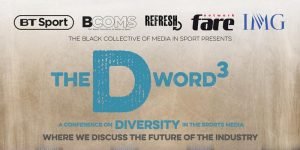
On 24 September, our network opened a short survey to assess LGBT inclusion in sports media, in advance of BCOMS’ #DWord3 conference on diversity in the industry.
The survey was open to all, and was anonymous. It closed on 28 October.
We wanted to gain a better understanding of the situation in sports media across the UK, and where there may be ongoing challenges.
We were particularly keen to get responses from LGBT people who are working, or have worked, in our industry.
You might ask… does any of this really matter? Our experience tells us that it does – but you don’t have to take our word for it. Increasingly, big businesses understand the importance of being LGBT-inclusive and are making it an integral part of their workplace culture and recruitment strategies. Watch this video released by the Vodafone Group during Pride Month in July 2018…
Our survey results
The Sports Media LGBT+ survey received 82 responses in total, with 67 of those coming from people – both LGBT and straight – who say they are either currently working in sports media, have worked in the industry in the past, or are seeking employment in this area.
Here’s an overview of the respondents and their relationship with sports media…
From the overall group of 82 respondents, the 67 ‘sports media people’ were then asked a series of further questions, while the other 15 were taken to the end of the survey in order to answer a general question about their perceptions of our industry (more on that later).
Here’s some more information about that group of 67 who took our survey in full…
Location: 55 of our sports media respondents said they are currently based in the UK, with 33 of those in London and the South-East. Of the remaining 12 respondents, 11 were based abroad, while one person declined to reveal their location.
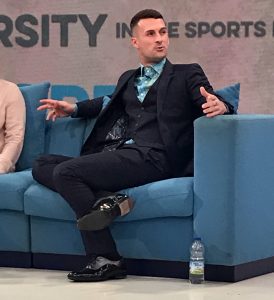
Network member Mark McAdam talking at the DWord3 conference, October 2018
Age: More than 40% of sports media respondents were aged 25-34, which was the dominant age range. Of the rest, 7.5% said they were over 55 years of age, with 20.9% at the other end of the scale in the 18-24 bracket.
Ethnicity: 88.1% of sports media respondents said they were white. Five people recorded that they were mixed race, with the ‘black or black British’ and ‘Asian or Asian British’ options receiving one response each. One person declined to answer.
Disability: Two people from the sports media group of respondents said they considered themselves to be disabled.
Gender: 79.1% of sports media respondents who were asked the question ‘what best describes your gender?’ said they were male. 12 answered female, and two people said they identified as non-binary.
Sexuality: 45 of the sports media respondents said they weren’t heterosexual or straight (of this number, one person told us they were asexual). See the pie chart below for more detail on this part of the survey…
Being out at work
We asked the 44 sports media respondents who said they were lesbian, gay, bisexual or pansexual whether they were open about their sexual orientation in their respective workplaces…
From these results, we can see that just over a third of those who aren’t straight say they are out to everyone at work.
However, the rest exercise varying measures of control over who else at work knows about their sexuality. In 22.7% of cases, those surveyed who are lesbian, gay or bi are not out to anybody they work with. The same amount – 22.7% – say they are only out at work to their close friends and colleagues.
In order to learn more about our respondents’ workplaces, we asked the following supplementary question…
Drawing upon your personal experiences in the sports media industry, how LGBT-inclusive have you found the workplaces / work environments in which you have been or are currently employed?
35 people wrote responses. These largely reflected well on the sports media industry, with 22 citing a mostly positive experience. The others would best be described as mixed, or were negative.
Here’s a sample showing the range of those responses…
- “Extremely welcoming, open and supportive”
- “Very inclusive where I work. A non-issue, as a queer woman.”
- “Current company is getting much better at creating a more inclusive environment.”
- “My work is very inclusive – my decision not to share my orientation is personal.”
- “Better now than in the past, but the industry is still a “one of the lads” environment in which to work.”

- “Inclusive because they know I’m gay. Otherwise I would say probably not that inclusive.”
- “Mixed – not a negative environment, but not one which I’m comfortable being open within. My employer is starting initiatives to be more LGBT-inclusive, which is encouraging.”
- “Inclusive in the sense that I’m not personally discriminated against and I feel comfortable being openly gay around my colleagues. However, there are still clumsy comments from time to time, which I believe to be based on ignorance rather than malice.”
- “People are accepting and non-judgemental when you tell them. However if you are not yet out or have not told all colleagues in the office, then a climate of passive homophobia is noticeable. Whether intended as ‘banter’ or colleagues just don’t realise there are LGBT people among their colleagues, it doesn’t create an overly welcoming environment. There seems to be the assumption that you’re straight unless you’ve told everyone straight away.”
- “Not very good. My previous employers wouldn’t have taken it well. They already made jokes and comments about me that were homophobic – albeit from their point of view as a joke. I’m not totally out now and I often think of them as a factor in me not being totally out now.”
Workplace attitudes
We asked our full contingent of 67 ‘sports media people’ (both those who are LGBT+, and those who aren’t) the following question…
Have you personally witnessed, or been subjected to, anti-LGBT language or behaviour in a sports media industry workplace setting in the last two years?
 Four people said the question was not applicable to them, and one person said they couldn’t be sure.
Four people said the question was not applicable to them, and one person said they couldn’t be sure.
Of the 62 remaining respondents, 28 of them (or 45.2%) answered ‘Yes’ to the question.
Meanwhile, looking solely at the 39 definitive responses to the question which were given by those who told us they were LGBT+, 21 of them (53.8%) were ‘Yes’. All but one of these responses came from gay or bi men.
We also asked the same group of 67 sports media respondents…
Have you felt discriminated against while looking for work or seeking a promotion in the sports media industry for reasons of sexual orientation and/or gender identity in the last two years?
13 people told us the question was not applicable to them. Out of the remaining 54 responses, 9.3% answered ‘Yes’, with a further 9.3% answering ‘Not sure’.
LGBT+ inclusion in the sports media industry
Our core group of 67 sports media respondents were then asked to give two overall grades to their industry on LGBT+ inclusion – one relating to sexual orientation, the other relating to gender identity. One respondent did not answer this part of the survey, giving us 66 responses.
For both graphs below, a grade of 1 represents ‘not at all inclusive’, while a grade of 5 represents ‘very inclusive’.
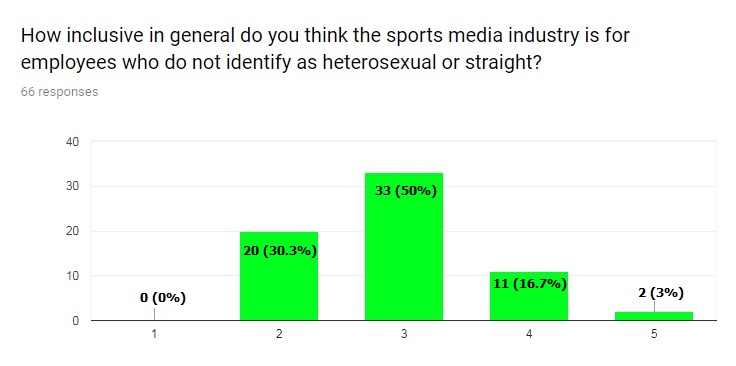
Only two people said they thought sports media was ‘very inclusive’ of lesbian, gay, bi and pansexual people – both of these responses happened to come from straight men. No one believed the industry was ‘not at all inclusive’, but just over 30% believe it falls below expectations.
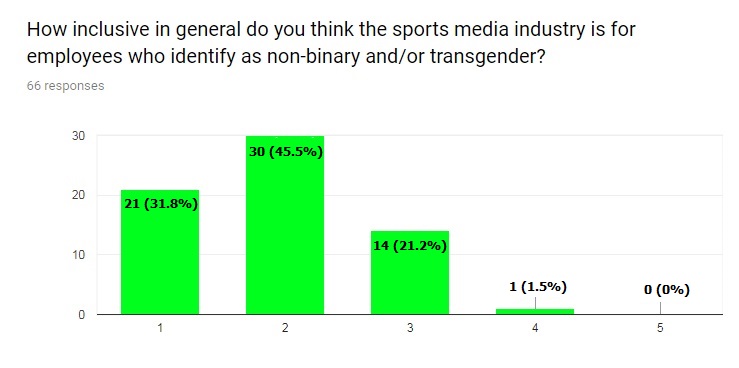
The lowest possible grade – ‘not at all inclusive’ – received 31.8% of responses (both of the non-binary people surveyed chose this option), while the next grade up received 45.5% of the overall share. Only one person surveyed thought the sports media industry was performing above average on inclusion for trans and non-binary people.
In a follow-up question, we asked…
What steps, if any, should sports media employers be taking to support LGBT+ inclusion in the industry?
A selection of the 35 responses are below…
- “The industry needs to include all types. Questions that are avoided by heterosexual people need to be addressed to bring more awareness.”
- “Recruiting managers in my department have ‘promoting a diverse workforce’ as part of their objectives this year. [But this is] diverse in relation to gender, race and disability. There is no specific mention of LGBT.”
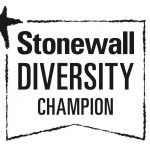
- “Become Stonewall Diversity Champions; have people at the organisation who are responsible for ED&I (equality, diversity and inclusion) and action it. That makes me think they are taking it seriously rather than just supporting visual campaigns which will make them look good for a few days.”
- “Leading from the top down by identifying best practice in inclusivity, then ensuring that all employees adhere to it. Discouraging / eradicating ‘banter’ which is directed at LGBT+ employees and others from outside the workforce.”
- “Provide more educational resources to employees and make a concerted effort to improve awareness of LGBT+ issues, particularly transphobia.”
- “I believe all staff should have to take a training course bi-annually to further understand LGBT+ rights and views, so that they can be better informed and change any negative mindsets towards LGBT+ people that may occur.”
- “The more diverse an environment, the better it is for LGBT people and other minorities. The industry still has a huge bias towards hiring cisgender males and that needs to be addressed.”

- “Equality awareness training for senior staff, potentially all staff. Clear editorial guidelines on LGBT issues. Close relationship with networks such as yours.”
- “A good idea would perhaps be to promote and/or engage in LGBT+ initiatives. If nothing else, it would remove any lingering concerns people may have about how committed the organisation really is to including LGBT+ people, beyond what they say officially.”
- “Hold inclusivity courses specifically looking at reducing offensive language in the workplace. Sometimes “banter” is more offensive than people think.”
The media’s role in LGBT+ inclusion in sport
Finally, we asked all 82 respondents – those 67 from the sports media core group, and those 15 outside the industry – to consider the effects of the media’s activity where it relates to LGBT+ inclusion in sport. The question posed was…
How would you assess the contributions of both the sports media and the wider media on LGBT+ inclusion in sport? Please provide examples that you feel have had positive and negative impacts.
The responses were wide-ranging and illuminating; 49 people took the time to write an answer. We’ve picked out 12 of them for you to read…
- “It’s two-faced; some media will happily carry LGBT awareness campaigns, and then you get trash newspapers still running stories about “secret gay footballer” etc.”
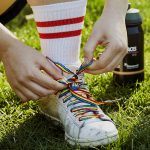
- “A lot better than it was a few years ago. Things like Rainbow Laces are helping, no doubt. Still a long way to go though, and I still fear that when the first player comes out, it’s not going to be done the way it should be.”
- “Aside from women’s football, I have not seen any examples of media having a positive impact on any LGBT+ inclusion in sport.”
- “For the most part, I think it has not particularly helped inclusion. Particularly in men’s sport, the language and culture in the media has not changed much to encourage inclusion of LGBT people in sport. Stories on the LGBT community in sport are still fringe stories published, for the most part, on small outlets which are probably only reaching people who are already engaged in the community. More effort to bring those stories into the mainstream is important.”
- “Sports media is generally more sympathetic and sensitive than they used to be. However, images like last week’s only ‘single’ man in a crowd of Ryder Cup WaGs, jarred.”
- “I think there are now plenty of LGBT+ role models in sport and this is largely down to the media’s coverage. They can always do more, but I’m happy with the amount of coverage currently given.”
- “Hit and miss. For every good article that highlights issues in the correct manner, there seems to be several more that are put together in the worst way – e.g. guessing game ‘who’s the gay player’ stories on the front page of tabloids.”
- “Poor, very poor – poor enough that in 15 years of working in the media, I have only met one openly LGBT+ person.”
- “I think it can be a bit of a simplistic approach in sport and football media – much of football media focuses on ‘why aren’t there any gay players?’ The coverage needs more depth and nuance, discussing broader issues around inclusion, grassroots homophobia, etc. I think there needs to be a closer relationship between news and sports desks, because news desks often put out harmful stories around LGBT issues, which damages LGBT inclusion in sport.”
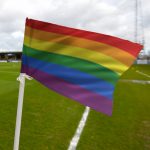
- “If the person on topic is treated like any other sports professional and their sexual orientation is no forefront issue over their professional work, then I am all for it. Negatives – it feels like in some cases a person’s screentime is reduced after coming out and then there’s the commodity element – rainbow microphones used during a broadcaster’s campaign recently, just silly.”
- “Very difficult to say, as I am at the very beginning of my career and still have very limited experience of working in the media. The fact that an openly gay man like Adam Crafton can hold such an important position within the Daily Mail’s sports department, however, strikes me as a very positive sign.”
- “In terms of published material, positive. But in terms of working environments etc, there are still big problems and no effort made to create inclusive workplaces – hence it’s not viable to be out.”
Conclusions
Jon Holmes, Sports Media LGBT+ network lead, writes…
Right from our first meeting over a year ago, when a few of us started discussing the idea of a sports media industry network for people who are LGBT, we all agreed we wanted to learn more about the experiences of others around the UK – and around the world – who are like us. We’re in a line of work that is clearly lacking in diversity and representation – just look at the figures from BCOMS’ D Word 3 conference – but is showing some encouraging signs when it comes to inclusion. Sports desks and related roles are still dominated by men, while people of colour are either in less visible jobs or are struggling to get a foot in the door. As for the LGBT experience in our industry, it’s rarely been discussed before, let alone in any detail; we felt it was important to examine it.
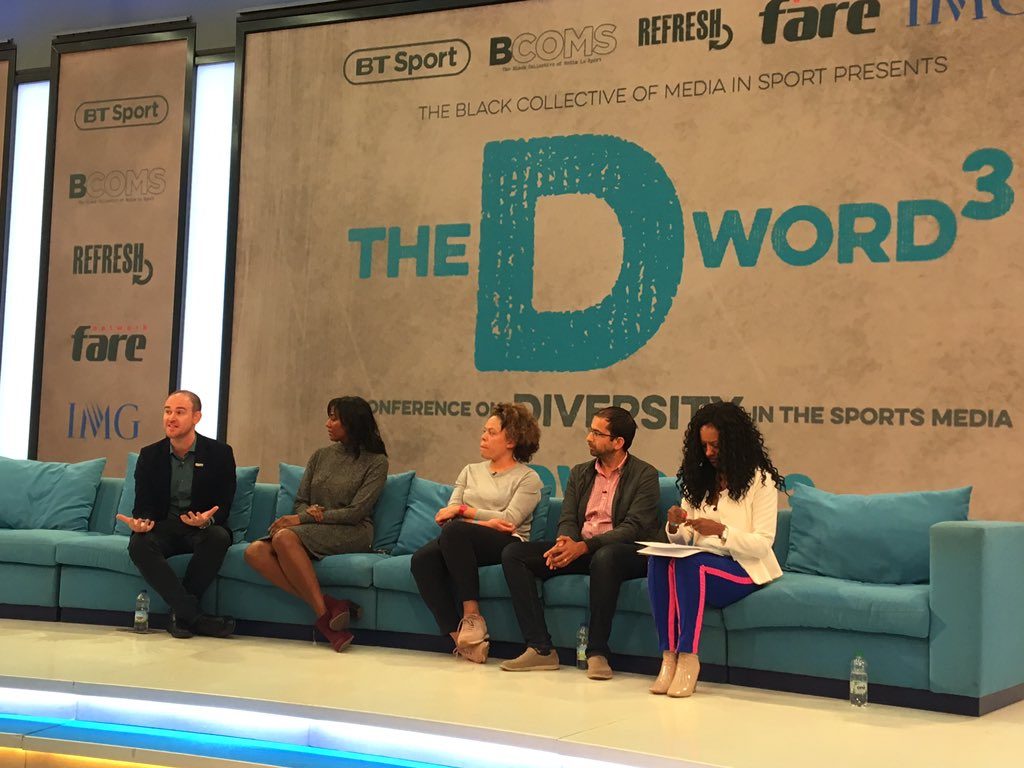
Jon (far left) speaking at the D Word 3 conference, October 2018
What we can see from the above data is that there are a significant number of employees in sports media who are LGBT, but almost half of them appear to be highly guarded about their sexuality or gender identity. This should undoubtedly be of concern to their bosses – extensive research has shown that LGBT people will be adversely affected when they don’t feel they can be their authentic selves. While it’s by no means essential to be ‘out’ at work, another statistic from our survey – that more than half of LGBT people have witnessed or have been subjected to homophobic, biphobic or transphobic language or behaviour at work since 2016 – indicates that some individuals in the environments in which we work are the direct cause of discomfort or worse, discrimination, to those same LGBT employees.
When people engage in anti-LGBT language and behaviour, it likely stems from a lack of education on issues related to sexual orientation and gender identity. Over 30% of those working in sports media think the industry is falling short on inclusion for lesbian, gay and bisexual people. Meanwhile, more than three in four sports media people think trans and non-binary employees are being let down due to a below-par standard of acceptance.
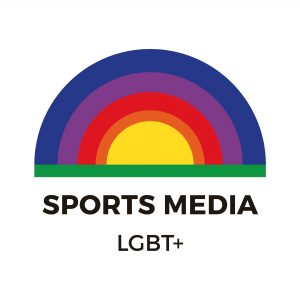
When we asked those taking our survey to tell us their experiences, thoughts and suggestions, we received lots of strong, insightful answers. Many wrote to say that as LGBT people, they felt completely included in their workplaces; these were hugely encouraging responses to read and showed the progress that has been made in recent years. Others explained that they had encountered difficulties in the past or in the present. Constructive feedback was provided for senior leaders; we urge them to read these and think about the difference that implementing inclusive practices could make.
At Sports Media LGBT+, we will continue to offer a welcoming space – both in person and online – for LGBT+ people and allies in our industry, and play our part in building a truly inclusive sporting landscape that empowers not just those who are competing but also those reporting on their achievements.
We’ll listen; we’ll find a way in which our network can provide support; and we’ll work to bring about a positive outcome.
Thanks to all those who took our survey, and for reading through the results.
You can get in touch with Sports Media LGBT+ by using our Contact form or by emailing us at info@sportsmedialgbt.com.
Further reading…
Decrease and development: Reflections on D Word 3
Share a story for Rainbow Laces
‘Amazing, inspiring’: #AuthenticMe at the BBC


